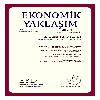Hayek ve Polanyi'nin İktisadi Düşüncelerinin Oluşumunda Viyana ve Budapeşte Etkisi
Vienna and Budapest Effect on the Formation of Hayek and Polanyi's Economic Thoughts
___
- Atılgan, S. (2000). Piyasa İle Devlet Arasındaki Gerilimin Teorisyeni: F. A. von Hayek, İktisat Dergisi, Temmuz 2000, s.16-24.
- Berenger, J. (1994) A History of the Habsburg Empire 1700-1918, Trans. C.A. Simpson, Longman, London, Newyork, 1994.
- Buğra, A. (1999). İktisatçılar ve İnsanlar: Bir Yöntem Çalışması, 2. Baskı, İletişim Yayınları, İstanbul, 1999.
- Butler, E. (1996). Hayek, Çev.Y. Z. Çelikkaya, Liberal Düşünce Topluluğu, Ankara, 1996
- Congdon, L. (1976). Karl Polanyi in Hungary 1900-19, Journal of Contemporary History, 11 (1), 1976, pp.167-183.
- Craver, E. (1986). The Emigration of Austrian Economists, History of Political Economy, 18:1, pp. 1-32.
- Deak, I.(1971). The Decline and Fall of Habsburg Hungary, 1914-1948, in Hungary in Revolution, 1918-19, Ivan Völgyes (eds.), University of Nebraska Pres, Lincoln, 1971, pp. 10-30.
- Duczynska-Polanyi, I. (2006). I First Met Karl Polanyi 1920… , in Karl Polanyi in Vienna, K.McRobbie, K.Polanyi-Levitt (eds.), Black Rose Boks, Montreal, New York, London, 2006, pp.302-315.
- Ebenstein, A. (2003). Friedrich Hayek A Biography, University of Chicago Press, 2003.
- Eörsi, I. (eds.) (1983). Goerg Lukacs Record of A Life, Transleted by R. Livingstone, London Verso, 1983.
- Gabor, E. (2006). The Early Formation of Karl Polanyi’s İdeas, in Karl Polanyi in Vienna, K.McRobbie, K.Polanyi-Levitt (eds.), Black Rose Boks, Montreal, New York, London, 2006, pp.295-301.
- Gamble, A. (1996). Hayek: The Iron Cage of Liberty, Polity Press, Cambridge, 1996.
- Gluck, M. (1991). Georg Lukacs and His Generation 1900-1918, Harward University Pres, Cambridge, London 1991.
- Gyurgyak, J. (2006). Karl Polanyi and Oscar Jaszi at the Beczı Magyar Ujsag, in Karl Polanyi in Vienna, K.McRobbie, K.Polanyi-Levitt (eds.), Black Rose Boks, Montreal, New York, London, 2006, pp.319-324.
- Hayek, F. A. (1988). Hayek On Hayek an Autobiographical Dilogue, S. Kresge, L. Wenar (eds.), London, Routledge, 1988.
- Hayek, F. A. (1992a). Historians and the Future of Europe, in, The Fortunes of Liberalism, Essays on Austrian Economies and the Ideal of Freedom Vol IV, Peter Klein (eds.), Routledge, London, 1992, pp. 201-215.
- Hayek, F. A. (1992b). The Economics of the 1920s as Seen from Vienna, The Fortunes of Liberalism Essays on Austrian Economics and the Ideal of Freedom P. G. Klein (eds.),:University of Chicago Press, Chicago, 1992, pp.19-37.
- Hayek, F.A. (1992c). Ludwig Von Mises in The Fortunes of Liberalism Essays on Austrian Economics and the Ideal of Freedom (ed. Peter G. Klein), Chicago: University of Chicago Press, 1992:126-159.
- Held, J. (1971). Heritage of the Past: Hungary Before World War I, in Hungary in Revolution, 1918-19, Ivan Völgyes (eds.), University of Nebraska Pres, Lincoln, 1971, pp. 1-9.
- Johnston, W.M. (1983). The Austrian Mind: An Intelectual and Social History 1848-1938, University of California Pres, Berkeley, Los Angeles, London: 1983.
- Kadarkay, A. (1991). Georg Lukacs: Life, Thought and Politics, Basil Blackwell, Oxford, Second Edition, 1991.
- Kirzner, I. (2001). Ludwig Von Mises,Willmington, Isi Books, 2001
- Litvan, G. (1990). Karl Polanyi in Hungarian Politics (1914-64), in Life and Work of Karl Polanyi, K. Polanyi-Levitt (eds.), Black Rose Boks Montreal, New York, 1990, pp. 30-37.
- Mason, J.W. (1997). The Dissolution of the Austro-Hungarian Empire 1867-1918, Longman, London and New York, Secon Edition, 1997.
- Mendell, M. (1994). Karl Polanyi and Socialist Education, in Humanity, Society and Commitment on Karl Polanyi, K. McRobbie (eds), Black Rose Boks, Montreal, New York, London, 1994, pp.25-42.
- Polanyi, K. (1957). The Great Transformation the Political and Economic Origins of Our Time, (1944) Boston: Beacon Press, 1957.
- Polanyi-Levitt, K. (1990). Introduction, in The Life and Work of Karl Polanyi, K. Polanyi-Levitt (eds), Black Rose Boks, Montreal, New York, 1990, pp.1-19.
- Polanyi-Levitt, K. (1994). Karl Polanyi as Socialist, in Humanity, Society and Commitment on Karl Polanyi, K. McRobbie (eds), Black Rose Boks, Montreal, New York, London, 1994, pp.115-134.
- Sked, A. (1989). The Decline and Fall of the Haabsburg Empire, 1815-1918, Longman, London, 1989.
- Steele, G.R. (1996). The Economics of Friedrich Hayek, Macmillian, London, St.Martin Press, USA, 1996.
- Vermes, G. (1971). The October Revolution in Hungary: From Karolyi to Kun, in Hungary in Revolution, 1918-19, Ivan Völgyes (eds.), University of Nebraska Pres, Lincoln, 1971, pp. 31-60.
- Vezer, E. (1990). The Polanyi Family, in Life and Work of Karl Polanyi, K. Polanyi-Levitt (eds.), Black Rose Boks Montreal, New York, 1990, pp. 18-25.
- ISSN: 1300-1868
- Yayın Aralığı: 3
- Yayıncı: Ekonomik Yaklaşım Derneği
Gelişmekte Olan Ülkelerde Doğrudan Yabancı Yatırımlar ve Ekonomik Büyüme İlişkisi
H. Aydın OKUYAN, Erman ERBAYKAL
Hayek ve Polanyi'nin İktisadi Düşüncelerinin Oluşumunda Viyana ve Budapeşte Etkisi
İktisat ve İşletme Alanlarında Verilen Eğitim İçerisinde Meslek Etiğinin Yeri ve Önemi
